TechRadar Verdict
Strong all-round protection against malicious apps, phishing sites, hacker attacks and more. The price is good, too, although if you’ve other hardware to protect, opting for Bitdefender Total Security covers all your other devices as well for only a little more.
Pros
- +
Accurate and reliable malware scanning
- +
Effective anti-phishing
- +
Stacks of features
- +
Great value
Cons
- -
VPN limited to 200MB/ day
Why you can trust TechRadar
Security vendors often save their best features for Windows, leaving mobile users feeling a little short-changed. Fortunately, that's not the Bitdefender way, and Bitdefender Mobile Security for Android is actually more powerful than some of the desktop competition.
It scans your apps for malware, for instance. Protects you from phishing and other malicious sites. Monitors texts and chat messages for dangerous links. Shields your internet activities with a limited VPN. Locks apps to prevent others viewing sensitive data. Raises the alert if your details appear in a data breach. And tracks or remotely locks your device with Mobile Security's built-in anti-theft tools.
The app does its best to look cheap at $1.25 a month for year one of the annual plan. But beware: it renews at $2.08 a month, and keep in mind that this only covers a single device.
If you've lots of hardware to protect, you can get Mobile Security bundled with Bitdefender Total Security. This offers full antivirus and many other tools for any mix of five iOS, Android, Windows and Mac devices for only $5 a month in year one, $8.33 on renewal.
The only catch here is the VPN, which limits you to 200MB a day, and doesn't support choosing a location (it automatically selects your nearest server.) But that could be enough for casual use, and it's more generous than some (Panda's free VPN allows 150MB a day, Avira's 100MB.)
Upgrading to Bitdefender's unlimited Premium VPN costs $6.99 billed monthly, or $2.92 on the annual plan. These are fair prices, but there are faster and more capable Android VPNs around. If web privacy is a priority for you, check our Best Android VPN Apps guide for more.

Bitdefender Mobile Security for Android: Getting started
After a hassle-free install, Mobile Security ran its first scan, checking our system and apps for threats in a speedy 30 seconds.
Sign up to the TechRadar Pro newsletter to get all the top news, opinion, features and guidance your business needs to succeed!
Mobile Security's dashboard appeared moments later. If you've ever used another security suite or app you'll recognize the layout: the main area of the screen displays your current device status, while a sidebar gives you quick access to Mobile Security's many features.
There's a lot to explore, but work through the various functions individually and you'll find most are straightforward to use.
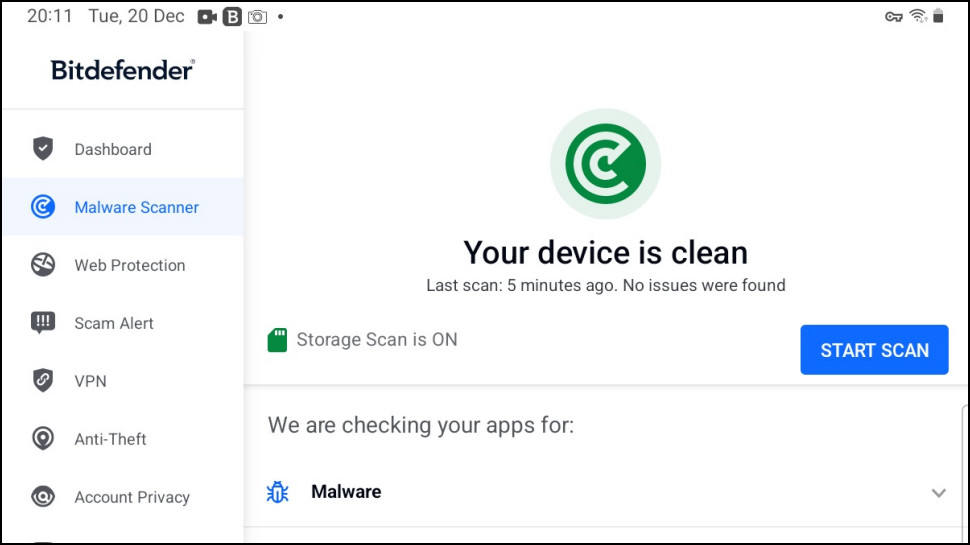
Bitdefender Mobile Security for Android: Malware Scanner
Mobile Security doesn't just check your apps for malware when you manually run a scan: it also monitors every app as it's installed, and raises an alert if it spots anything dangerous.
We tried this with a test app, and Mobile Security popped up an immediate warning.
Results from the big independent testing labs suggest these are very accurate recommendations, too. We checked the most recent AV-Test, AV-Comparatives and MRG Effitas Android reports, and they each placed Bitdefender Mobile Security in first or equal first place for malware protection.

Bitdefender Mobile Security for Android: Web Protection
Bitdefender's Web Protection blocks access to phishing and other malicious sites, reducing the chance that you'll be caught out by dangerous links in your inbox or social feeds.
We tested Bitdefender’s web protection by seeing how it performed when faced with 100 brand new malicious URLs from phishing experts OpenPhish [https://openphish.com/]. Bitdefender blocked 96%, which is a great result, but not quite the best we’ve seen. The company was just a touch ahead of Norton’s 95%, for instance, but Avast blocked 100% of our test URLs in its last test, for instance, while Avira blocked a full 100%.
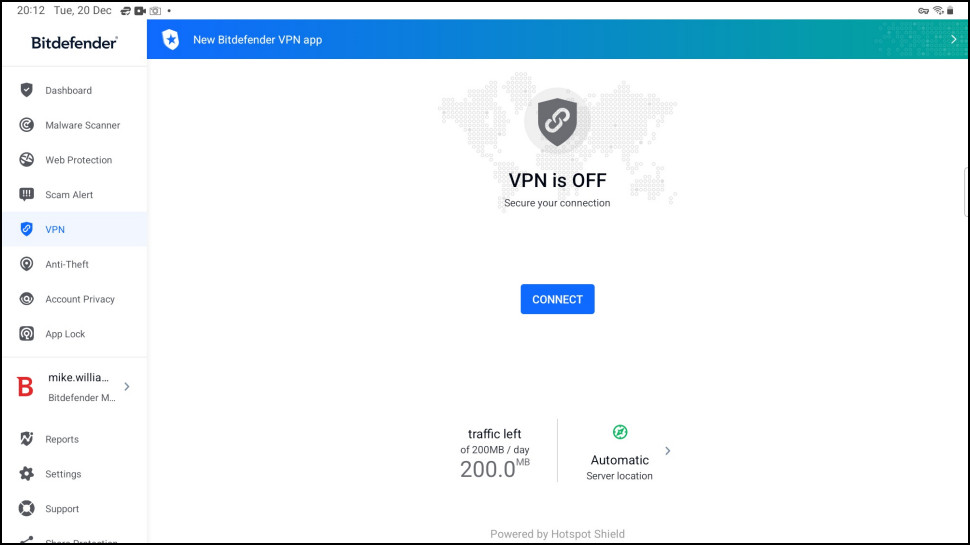
Bitdefender Mobile Security for Android: Bitdefender VPN
Connecting your device to Bitdefender's Hotspot Shield-powered VPN is easy. Tap VPN, then Connect, and in a couple of seconds it's up and running, protecting your web traffic from snoopers. Speeds were reasonable in our tests, and connections proved stable, with no unexpected drops.
The problem? It's extremely basic. As we write, you can't choose a location, switch protocols, adjust settings or reconfigure how the VPN works in any useful way. If you only need the core VPN essentials, this might be acceptable. But if you're looking for anything even slightly more advanced, it's likely to leave you disappointed.
Bitdefender clearly realizes the problem, and Mobile Security for Android will soon be updated to use the regular stand-alone Bitdefender VPN app. That's good news, as it gets you many more VPN features (ad and tracker blocking, choice of protocols, split tunneling, more.) But if the VPN is your priority, it's a reminder that you could simply ignore Mobile Security and just install the Bitdefender VPN for Android app, instead.
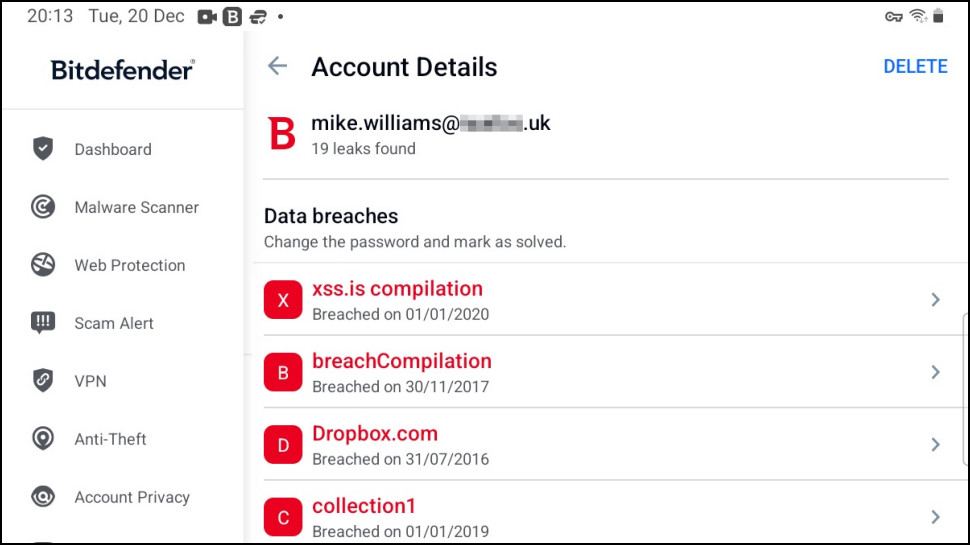
Bitdefender Mobile Security for Android: Account Privacy
Bitdefender's Account Privacy feature scans a list of data breaches for as many email addresses as you need, and raises the alarm if your details have been exposed.
We tapped 'Account Privacy' to try it out. The app sent a code to the email address to verify that we owned it, then displayed an alarmingly lengthy list of breaches where our address appeared.
This isn't quite as useful as it sounds. Although our list included 19 breaches, only four were dated 2020 or later, and the most recent of those was from February 2021. If you follow the standard advice to change your passwords occasionally (and we do, of course), this isn't going to tell you much at all.
There is still value here. Maybe your list will be more relevant, and you can sign up to get alerts when new breaches appear. But the reality is you can do this for free anyway at haveibeenpwned.com, no need to install Bitdefender Mobile Security or anything else.
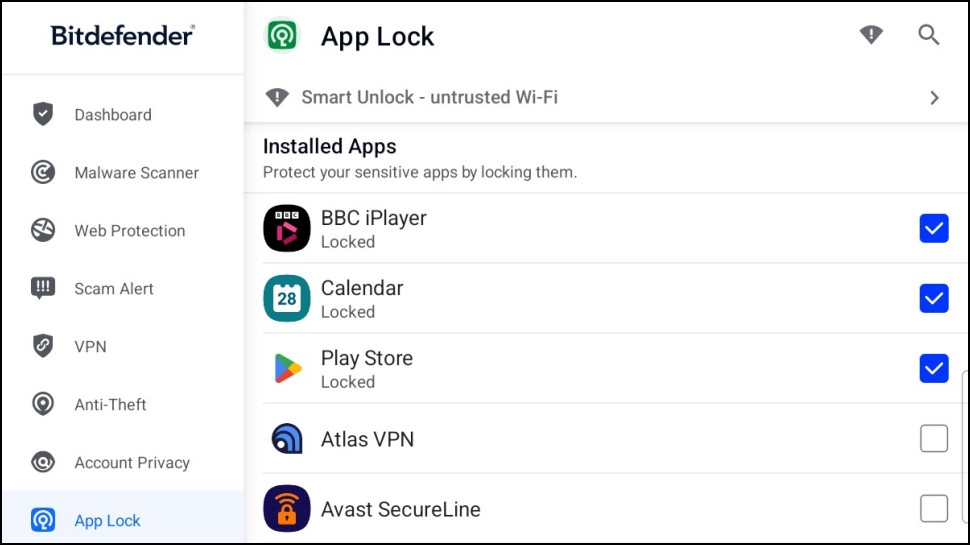
Bitdefender Mobile Security for Android: App Locker
Bitdefender's App Locker enables protecting others from launching specific apps and perhaps viewing sensitive details. It's very useful if you'd like to pass your device to a friend or family to use the phone or browser, say, but don't want them to have full access to everything else.
It's an effective system, and far more usable than some lockers. Although by default App Locker prompts you to manually unlock every protected app, every time you launch it, for instance, you can also have unlocking one app automatically unlock all the others until your screen turns off. Far more convenient if you're just worried about someone picking up your device.
There are stacks of surprising bonus features, too. It can use a random numeric keyboard, reducing the chance others can read your pin by watching your finger movements. It'll snap a photo of the user after three failed PIN entries, and can then upload the pics to your Bitdefender account so you can view them from other devices. It's all very well put together, and adds real value to the app.
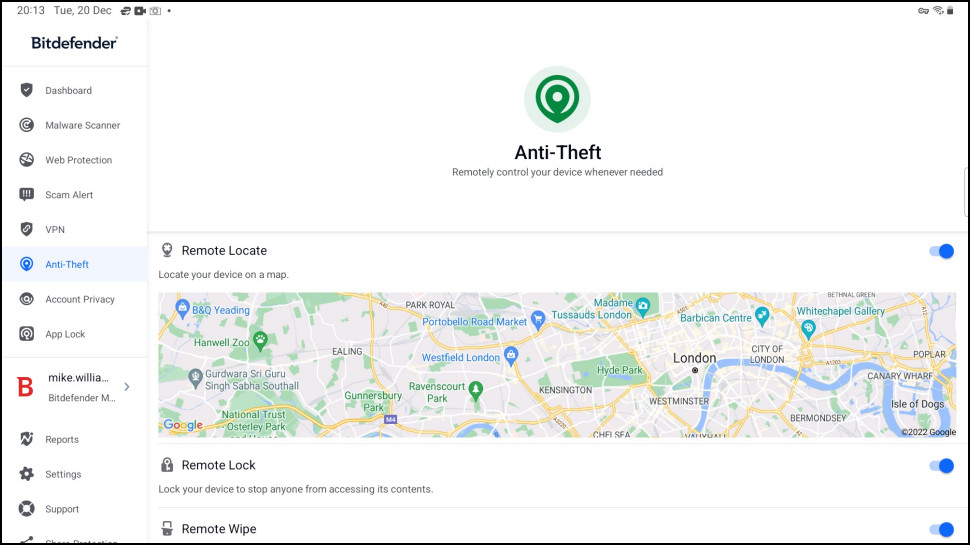
Bitdefender Mobile Security for Android: Anti-Theft
Bitdefender Mobile Security also includes some Anti-Theft features, which cover most of the ground you'd expect.
Remote Location support may allow you to track your device from Bitdefender's website or other apps, for instance. And if it doesn't, the app can snap a photo of the thief after three failed attempts to unlock the device, perhaps giving you more clues.
If your device really has been stolen, you can remotely lock it or even wipe its contents and reset to a factory state. Or if you've just mislaid it somewhere, a 'Scream' command plays an audio alert to help you track it down.
There's nothing new here, and if you've a number of Android devices, you could get very similar features and more convenient reporting with Google's Find My Device for free.
We found Bitdefender's Anti-Theft tools worked as advertised, though, and if you're planning to install and manage Bitdefender on a number of devices, it could be more convenient to have Anti-Theft available for all your hardware from the same dashboard.
Bitdefender Mobile Security for Android:
Bitdefender Mobile Security for Android is a powerful security tool which gives you rock-solid protection from a host of security threats. Okay, the VPN is very basic, but we wouldn’t expect any better price, and overall Bitdefender Mobile Security is a great Android choice.
We've listed the best internet security suites.
Read more Bitdefender reviews:
- Bitdefender Antivirus Plus review
- Bitdefender Internet Security review
- Bitdefender Total Security review
- Bitdefender Mobile Security for Android review
- Bitdefender Mobile Security for iOS review

Mike is a lead security reviewer at Future, where he stress-tests VPNs, antivirus and more to find out which services are sure to keep you safe, and which are best avoided. Mike began his career as a lead software developer in the engineering world, where his creations were used by big-name companies from Rolls Royce to British Nuclear Fuels and British Aerospace. The early PC viruses caught Mike's attention, and he developed an interest in analyzing malware, and learning the low-level technical details of how Windows and network security work under the hood.
